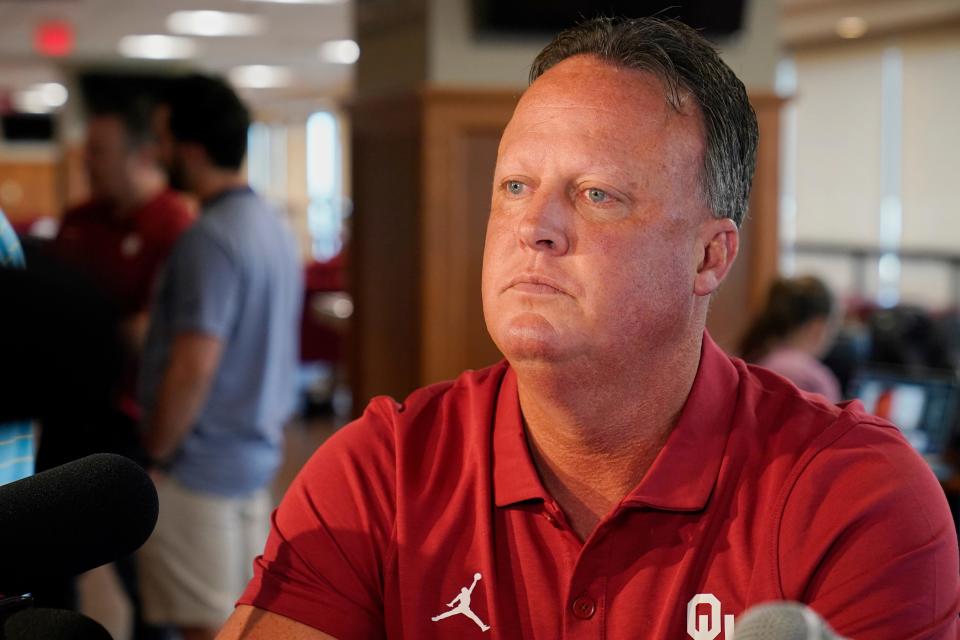Former Oklahoma assistant Cale Gundy used a word white people can never say | Opinion
The ugly, confusing, and head-shaking case of former Oklahoma assistant football coach Cale Gundy, in many ways, comes down to one simple question:
Who can say that word? You know what word I'm talking about.
One answer, the biggest answer, is not white people.
Under any circumstances. At any time. In any way. Never. Ever. Ever.
Don't care how many songs you heard it in. Don't care how many times Denzel Washington said it in "Training Day." Don't care if you're around Black people and you hear us say it. Don't care if you love the rap group N.W.A. White people cannot use it.
Gundy apparently forgot this rule and he paid a price for it by resigning, which he should have.
More: The 10 best non-conference games for the upcoming college football schedule
More: Alabama in familiar spot. Crimson Tide are No. 1 in preseason USA TODAY Sports AFCA Coaches Poll
More: Wake Forest QB Sam Hartman out indefinitely due to 'non-football-related' medical condition
That is the one certain part of a confusing story that seems to still be unfolding and may for some time. While there are parts of it that are unexplained, what isn't up for debate is that Gundy crossed a line, and shouldn't be forgiven for it.
Gundy said in a statement he inadvertently read aloud "a word that I should never – under any circumstance – have uttered." Gundy said he read it off the screen of a player's iPad during a film session.
While Gundy said he read aloud "a word," head coach Brent Venables later issued his own statement saying the word was said multiple times.
"Coach Gundy resigned from the program because he knows what he did was wrong," Venables said in a statement. "He chose to read aloud to his players, not once but multiple times, a racially charged word that is objectionable to everyone, and does not reflect the attitude and values of our university or our football program. This is not acceptable. Period. Coach Gundy did the right thing in resigning. He knows our goals for excellence and that coaches have special responsibilities to set an example."
Venables, at his press conference on Wednesday, didn't publicly address the specific incident in detail (Venables did say the team had a three-hour meeting on Saturday). Overall, he clearly wants to put everything behind him. Can't blame him for that but this is damage that will likely be felt for some time. It will not easily go away.
So this is potentially the scenario of what happened. Gundy is reading off the player's iPad and sees the word. He reads it. He apparently doesn't stop with reading it once, according to Venables. He apparently reads it at least once more.
Why did he read it once? Why possibly at least twice? Why didn't he just skip over the word? Why did he feel like it was okay to say it?
It's impossible to get inside his head but the simple explanation is he felt comfortable doing so, and that in itself is highly problematic, and unforgiveable.

What has struck me most about this ugly moment is the amount of sympathy Gundy has received from some in the media and others who have followed this story. People have portrayed Gundy almost as a victim. Talked about forgiveness. Reconciliation. That's one thing Black folks are always asked to do when facing racism: forgive. Venables was even asked during the press conference about the "tenets of forgiveness."
When a mass murderer attacks us in a grocery store ... forgive. When we're just jogging down the street and attacked and killed ... forgive. When a racial slur is used ... forgive.
No, thank you. Gundy is 50 years old. He's more than old enough to know not to use that word, any version of it, under any circumstances. He likely learned this when he was a kid.
How Black people use that word is our business. I don't use any version of it but there are plenty of Black people, including entertainers and others, including my friends, who do. Not my thing but it's our decision to make.
And I don't care if Joe Mixon vouches for Gundy. In the same way I don't speak for all Black people, neither does Mixon. Neither does any other Black player or person. The fact Mixon thinks Gundy isn't racist is fine, and maybe Gundy isn't, but issues of race are complicated and thick. The fact Gundy felt comfortable reading that word aloud is immensely problematic and easily, without question, worthy of Gundy losing his job.
If other players on the team are also sympathetic to Gundy, that's OK, too. They are close to him and played for him. Not all Black people think exactly alike. Yet some players may excuse Gundy because they are part of a team whose success and failure is directly tied to it being unified. Let's just say it would be far from unusual for players and coaches to just want to smooth things over so they can win games.
I can also guarantee there are players in that room who heard what Gundy said and were furious about it.
Again, all of this comes back to the original question: who can use that word?
The answer is not Gundy. Not any white person.
Period.
This article originally appeared on USA TODAY: Cale Gundy forgot white people can't say that word

